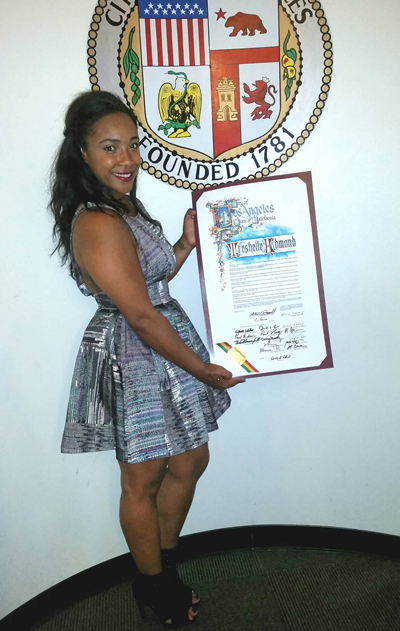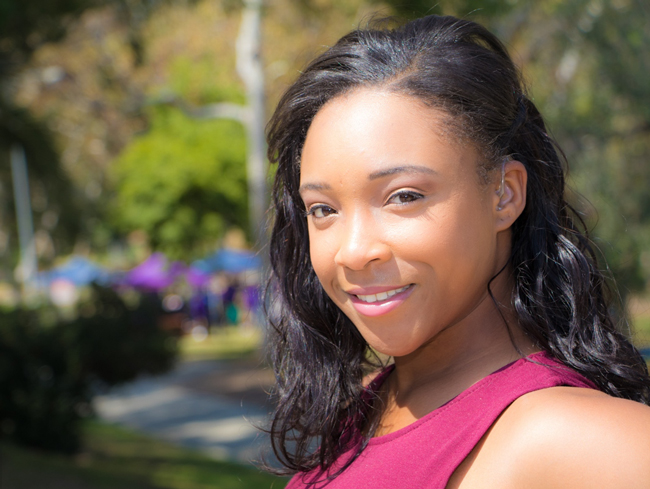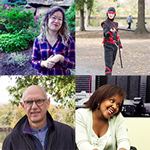Faces Behind the Screen: Treshelle
Quick Links
<< Return to all “Faces Behind the Screen” stories
In film and on television, Deaf characters all too often siloed into roles that exaggerate their deafness, or make the fact that they are deaf an exotic or dramatic element of the plot. That’s why a certain episode of Aziz Ansari and Alan Yang’s Netflix series Master of None is making such a positive impact right now.
In the episode “New York, I Love You,” actress Treshelle Edmond plays a bodega clerk, Maya, who puts up with a stranger hitting on her, argues intensely with her friend who’s been caught copying her style of dress, and gets hilariously scolded by a concerned mother after confronting her husband about their bedroom intimacy problems in public. What the viewer will also notice is that Maya happens to be deaf. There is no audio at all during the segment (to mimic the experience of being deaf), and all dialogue is conducted in ASL with English subtitles.
The brilliance of the episode is how it gives the Deaf character more agency than in traditional roles, which, when combined with silence and visual elements like sign language and subtitles, creates a much more life-like and empathetic experience for the viewer.
We recently had the pleasure of asking Treshelle (who identifies as both Deaf and hard of hearing) some questions about her role in Master of None, how she feels about being a Deaf actress in the public eye, and a few other questions we like to ask in our interviews for Faces Behind the Screen:
How have you felt included or excluded by the theater/TV/film community?
More recently, I have felt included by both theater and television with theater productions like Spring Awakening and television shows like Master of None. Deaf West choosing to split the roles with one hearing and one deaf person was genius. It did something in theater that had never been done. I hope there will be more productions like that.
Master of None took a look into ordinary people’s lives and showcased that. I played the role of Maya, the clerk at the bodega that happens to also be deaf which is different from saying ‘the deaf clerk at the bodega’. I was able to relate to the character of Maya a lot because scenes like that happen to me pretty much daily. People will talk to me and when I say “I’m Deaf” they make up their own signs for sign language. It’s pretty funny but I do appreciate them even trying to communicate with me instead of just staring or feeling uncomfortable. I’m just a regular person like everyone else. My deafness does not define me.
As for being excluded, it’s tough in this industry being a black deaf actress. There usually aren’t a lot of roles out there. It is clear that they have a lot to learn about diversity and inclusion. Representation really does matter.
“I’m just a regular person like everyone else. My deafness does not define me.”
How do you feel you have made an impact by being a Deaf person in the public eye?
I feel like being a deaf person in the public eye means that I am able to show people that being deaf isn’t an inhibition. It doesn’t hold me back and it shouldn’t hold anyone else back. Being in the public eye gives me a larger platform to show that deaf people can do anything.
What is your proudest moment?
It’s hard to just pick one moment but maybe last September when I was honored by the city of Los Angeles with a plaque for my contributions to the deaf community and September 28 was declared Treshelle Edmond Day.

Here’s a photo of Treshelle holding up her document given by the City of Los Angeles officially declaring September 28th as Treshelle Edmond Day. She has her own day in LA! That is so, so objectively cool.
Okay, back to the interview…
What was your first memory of struggling to communicate?
As far back as I can remember I struggled to communicate with my mom and my family. She would make me talk and I didn’t know American Sign Language (ASL) back then and no one else in my family signs. She taught me how to enunciate words. I remember she would put my hand on her neck when she was say words or put her lips to mine so I could feel what they were like. It was hard but I’m proud of my mom for being the best mother she could. She taught me that I have the best of both worlds in being oral and speaking in ASL so I try to embrace it. I think she did a pretty good job.
How do you feel technology helps or hurts your ability to communicate?
Technology helps in so many ways especially to clarify things. For example, text messaging is a life saver! At the same time, I also feel it can hurt personal relationships with people especially if you’re always on your phone. It is important to have eye contact and connect with people. I think technology sometimes takes away from that but I’m grateful to have it.
“We really aren’t any different. The only thing we can’t do is hear.”
What has your experience been like working as a Deaf actress?
My experience working as a Deaf actress has been amazing. I have been blessed to be able to show authenticity in my roles as to what real Deaf/hard of hearing people are going through in their everyday lives. More importantly, the actual depiction of Deaf and hard of hearing people can be seen as having the same issues as those that are hearing, both good and bad. For instance, Master of None — I was able to portray situations that I, personally, deal with daily. We really aren’t any different. The only thing we can’t do is hear.
Compared to other depictions of Deaf people on TV, how do you feel about the way in which Aziz Ansari and Alan Yang chose to represent your character as a Deaf character in Master of None?
I feel like Aziz Ansari and Alan Yang did a wonderful job in the way they chose to represent my character in Master of None. Turning the sound off was a huge risk but it was extremely affecting. It made people pay attention! It showed the world exactly how we navigate through life on a daily basis while also showing me as a regular person with a job, a husband, friends, and a social life. It showed the struggles in communicating in life which is largely why my mother wanted me to be oral. She was very firm about me being able to communicate with anyone that crossed my path. I have to thank her for that.
“My journey is not an easy one but being deaf made me strong and so I feel like I’m up for the challenge.”
What’s a common mistake hearing people make when interacting with Deaf people?
One common mistake hearing people make when interacting with Deaf people is yelling. Talking loud isn’t going to make a Deaf person hear you. They also make the mistake of looking away or covering their mouth when speaking to you.
What is the best thing about being Deaf?
The best thing about being deaf is it made me a fighter. Being deaf helped me be more expressive and just be me. My journey is not an easy one but being deaf made me strong and so I feel like I’m up for the challenge.
—
A huge thanks to Treshelle Edmond for so thoughtfully taking our questions and to her booking manager for helping us get in touch.
Treshelle is currently playing the role of Lydia in the theatrical production of Children of a Lesser God which plays from June 22 to July 22, 2017 through the Berkshire Theatre Group in Stockbridge, MA.
Faces Behind the Screen is a storytelling project focusing on members of the Deaf and hard of hearing community.





